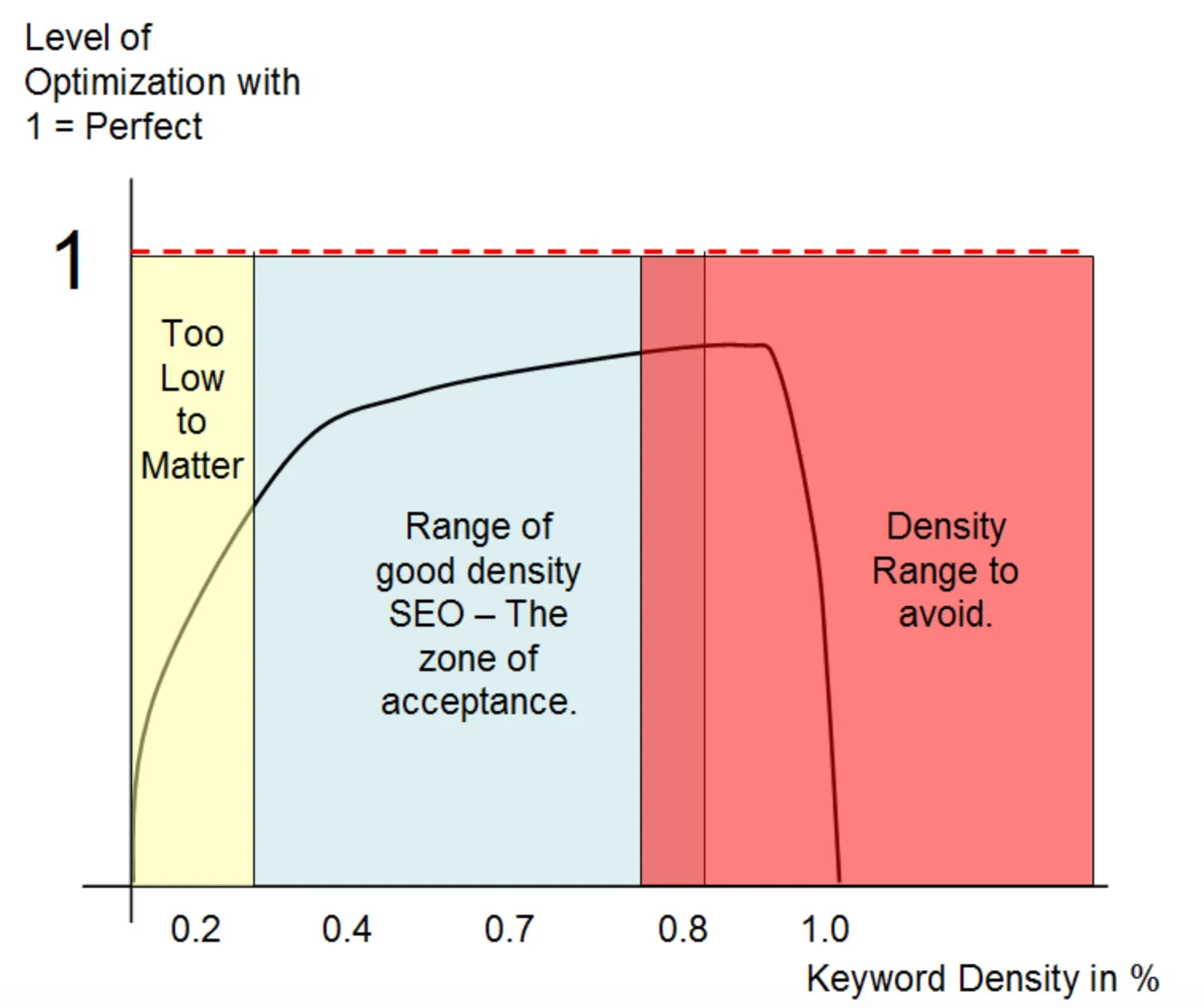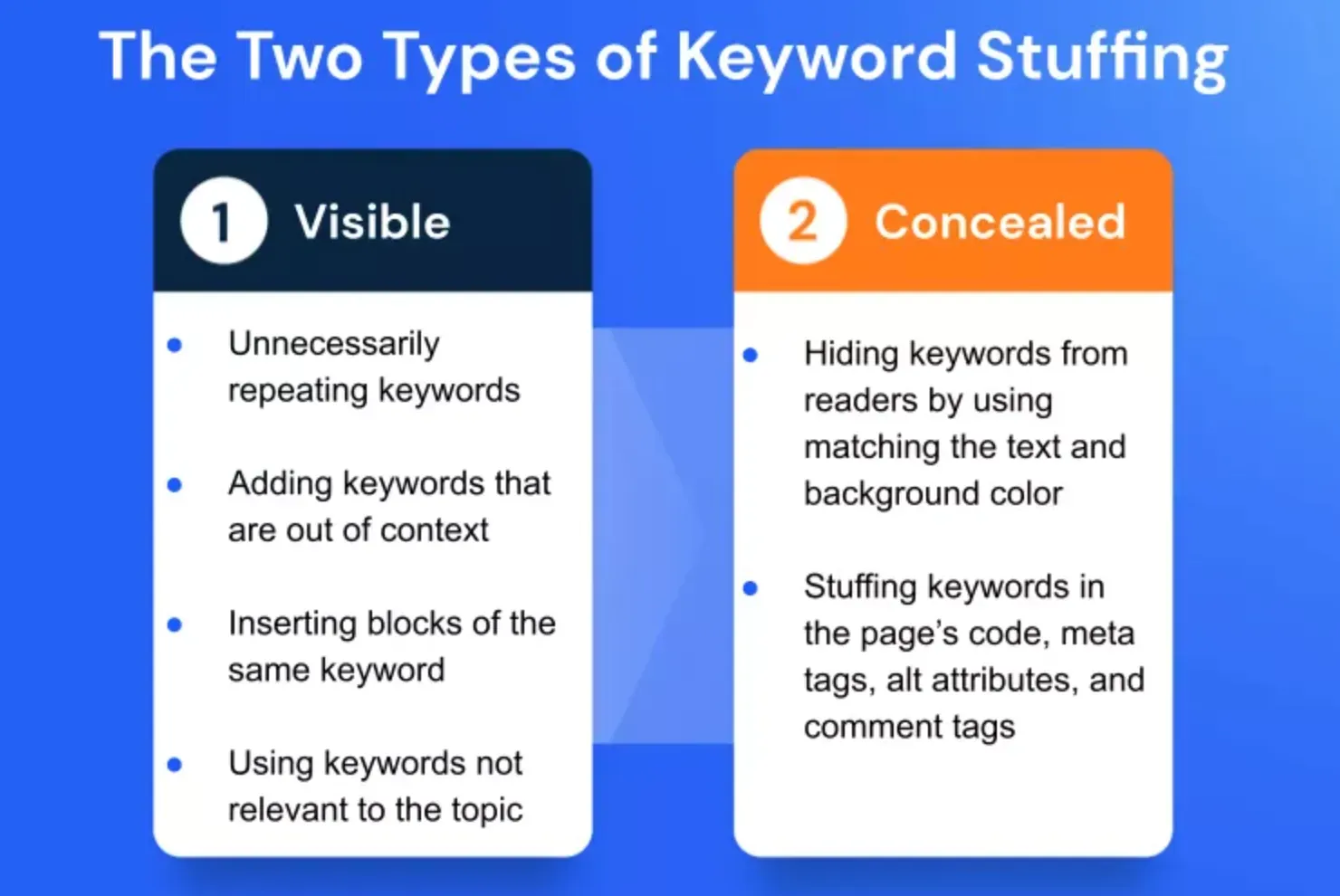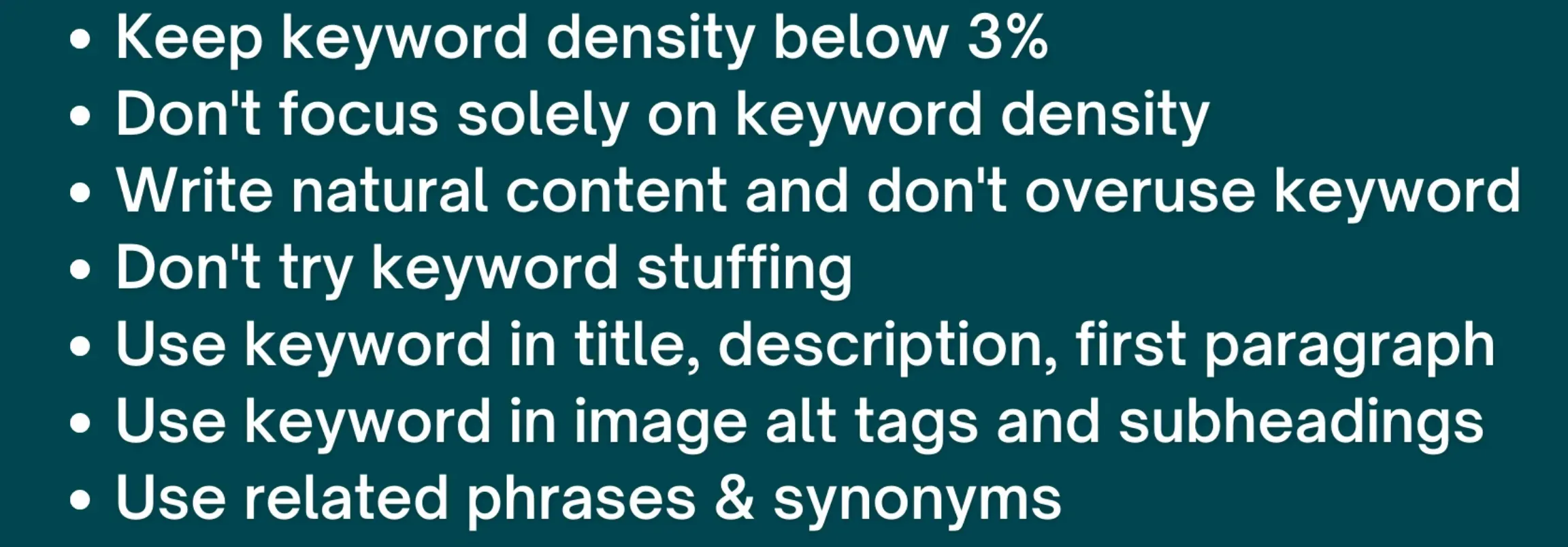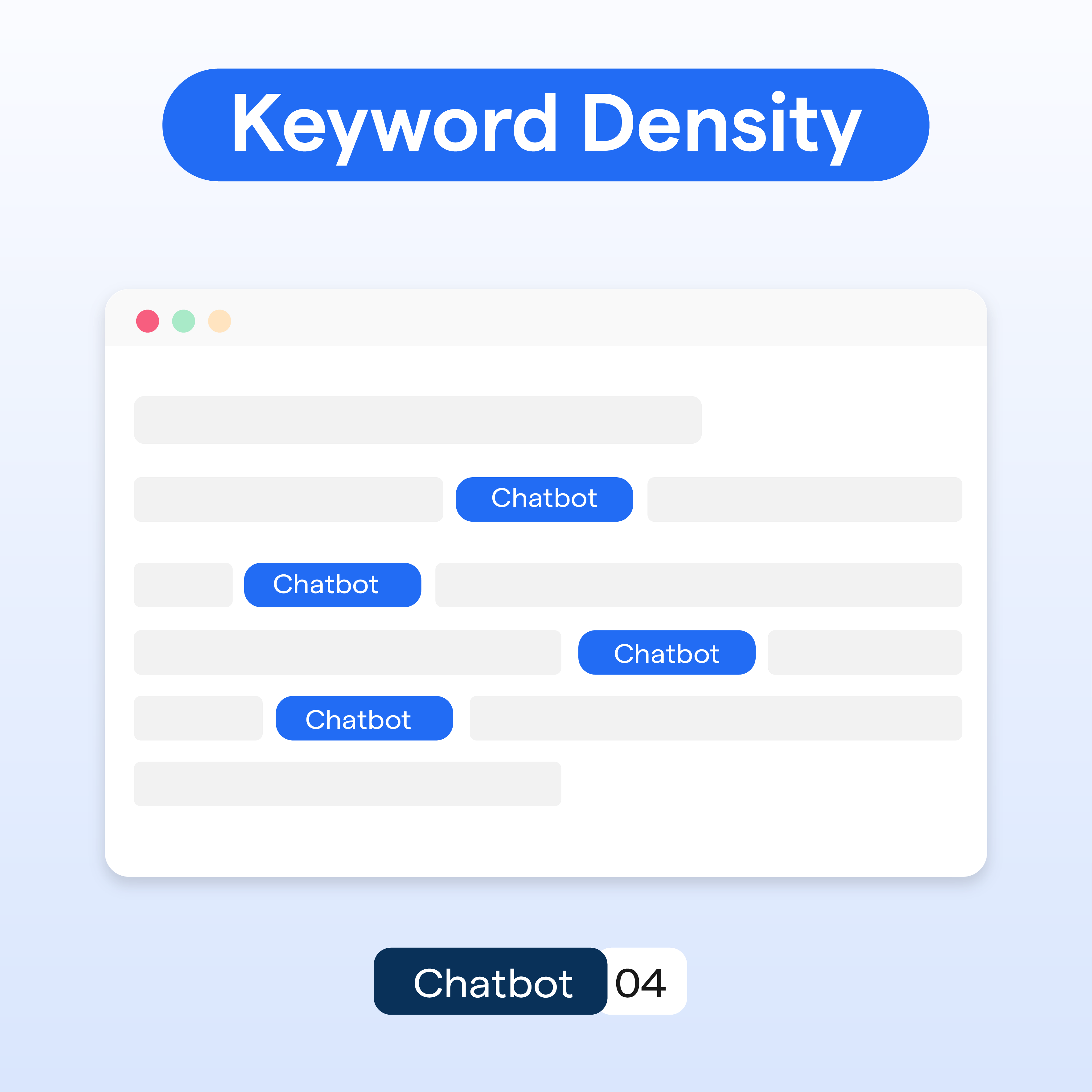What is Keyword Density?
Keyword Density is the percentage of how frequently a specific keyword appears in a piece of content, relative to the total number of words in that content. It's an essential aspect of Search Engine Optimization (SEO), affecting how search engines rank the content.
For instance, if you have a 500-word blog post and your target keyword appears 10 times, the keyword density is 2% (10/500x100). By optimizing keyword density, your content becomes more relevant to search engines, increasing the chances of higher rankings.
The Purpose
Maintaining an appropriate keyword density helps search engines understand the primary focus of your content, making it easier for your target audience to find your page.
Why is Keyword Density Important?
Let's explore the significance of Keyword Density and its impact on search engine rankings and user experience.
Impact on Search Engine Rankings
Search engine algorithms assess keyword density to identify the relevancy of your content for specific search queries. A balanced keyword density can improve your page's search engine ranking, ultimately helping users find your content more easily.
Enhancing User Experience
Optimal keyword density provides a better user experience by ensuring your content addresses a particular subject without feeling cluttered or spammy. If you overuse keywords, you risk alienating your readers, reducing the chances of converting them to clients or customers.
How to Calculate Keyword Density?
How do you measure keyword density? As simple as it may sound, it involves a quick, easy-to-follow formula.
The Formula
Keyword Density = (Number of times the keyword appears / Total number of words) × 100

The Tool-Based Approach
Alternatively, you can use various online keyword density checkers that compute the density automatically.
Example Calculation
In a 1000-word article with a keyword appearing 20 times, the keyword density would be: (20/1000) × 100 = 2%
What is the Ideal Keyword Density?
The ideal keyword density is subjective, but it's essential to strike a balance for improved SEO.

Google's Perspective
Google does not provide a specific percentage for optimal keyword density. However, experts generally recommend maintaining a range of 1-3%.
Quality Over Quantity
While it's important to include relevant keywords, high-quality content with contextual use of keywords is more critical. Google prioritizes user experience, so the focus should be on creating helpful content that resonates with your audience.
Semantic Keywords
Using synonyms, related phrases, and LSI (Latent Semantic Indexing) keywords also help search engines understand your content's context, improving your page's ranking without keyword stuffing.
How to Optimize Keyword Density?
Optimizing keyword density involves strategically using your target keyword throughout your content.
Title and Headings
Incorporate your keyword in the title, meta title, and H1 heading. It's beneficial to include it in H2 and H3 headings as they act as sub-topics, reinforcing the primary keyword's relevance.
Body and Paragraphs
Ensure your keyword is evenly distributed within the body and paragraphs. Maintain a natural flow of language and avoid disrupting the reader's experience with keyword stuffing.
Bold, Italics, and Underline
Accentuating your keyword using bold, italics, or underlining helps signal its importance to search engines. However, use it sparingly, focusing on maintaining a reader-friendly text.
Image Alt-Tags and Captions
Adding the target keyword to image alt tags and captions improves accessibility and image search rankings, further optimizing your content for search engines.
What are the Consequences of Overusing Keywords?
Before you start adding keywords to your content, consider the repercussions of overstuffing.

Reduced User Experience
Keyword stuffing can make your content confusing, repetitive, and unreadable, repelling users instead of engaging them.
Search Engine Penalties
Overstuffing can easily get flagged by search engine algorithms, resulting in an adverse impact on your search engine rankings - or even being completely removed from search engine results.
Long-Term Damage to Reputation
Overusing keywords can ultimately damage your brand reputation as visitors may perceive your content as low-quality, spammy, or untrustworthy.
How Does Keyword Density Evolve Over Time?
Now that we have a clear understanding of keyword density, let's reflect on the changes it has undergone over time.
Early Days of SEO
Initially, search engines heavily relied on keyword density to help identify content relevancy. A higher keyword density improved the chances of appearing on top of search results.
The Evolution
Google's algorithms evolved, focusing more on quality, relevance, and user experience. As a result, high keyword density began to impact content negatively.
Impact of AI and Natural Language Processing
With advancements in AI and Natural Language Processing, search engines analyze the context, semantics, and intent behind user queries, making keyword density less crucial and allowing a more natural writing style.
Best Practices For Keyword Density
By following these best practices and tips, you'll be able to create content with optimal keyword density that appeals to both search engines and human readers.

Start with Thorough Keyword Research
Start by identifying relevant keywords and phrases for your content. Use tools like Google Keyword Planner, SEMrush, or Moz Keyword Explorer to find popular search terms related to your topic. This will help you create content that addresses what your target audience is looking for.
Prioritize Readability and Quality Content
Focus on creating engaging, informative content that provides value to your readers. Write for humans, not search engines. This means ensuring your content flows naturally and doesn't feel stuffed with keywords. High-quality content will help your website gain more traction and rank higher in search results.
Aim for an Appropriate Keyword Density Range
Keyword density is the percentage of times a keyword appears in the content compared to the total number of words. While there is no definitive optimal keyword density, experts generally recommend keeping it between 1-2%. This ensures that search engines can understand your content's focus without it appearing spammy.
Leverage Long-Tail Keywords and Semantic SEO
Utilize long-tail keywords, which are longer, more specific phrases relevant to your content topic. Long-tail keywords tend to have less competition and better conversion rates. Additionally, incorporate semantic SEO by using synonyms and related terms. This helps search engines understand your content better and makes it more relevant for varied searches.
Strategically Place Keywords
Make sure to include your primary keywords in key areas like the title, URL, headings, and meta description. This signals to search engines the core topics of your content. But remember to be mindful of keyword stuffing and keep the content natural.
Use LSI (Latent Semantic Indexing) Keywords
LSI keywords are terms related to your main keyword. Including these in your content can help search engines better understand your content's context and relevance. You can find LSI keywords using tools like LSIGraph or just by searching your main keyword and observing related search terms.
Monitor and Analyze Keyword Performance
Track your keyword performance using tools like Google Analytics or other SEO monitoring platforms. Monitoring helps you identify keywords that are effective and those that need to be improved or replaced. Regular analysis will help you fine-tune your keyword strategy.
Optimize Your Content Over Time
Remember that SEO is an ongoing process. As search engine algorithms change and your website grows, you should revisit your content and keywords to improve and optimize them. Make adjustments based on your analysis, new keyword research, and feedback from your target audience.
Frequently Asked Questions (FAQs)
What is Keyword Density?
Keyword Density refers to the percentage of how frequently a specific keyword appears in a piece of content, relative to the total number of words in that content.
Why is Keyword Density Important?
Keyword Density is essential in ensuring the relevancy of your content, affecting both search engine rankings and user experience.
How can I calculate Keyword Density?
Keyword Density can be calculated using the formula: (Number of times the keyword appears / Total number of words) × 100
What is the ideal Keyword Density?
The ideal keyword density is subjective, but experts generally recommend maintaining a range of 1-3%.
Does high Keyword Density guarantee better search engine rankings?
No, high keyword density can negatively impact your content's quality, readability, and search engine rankings. Instead, focus on creating valuable, user-friendly content enriched with relevant keywords.

